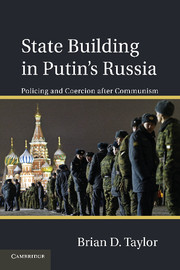Book contents
- Frontmatter
- Contents
- List of Figures, Tables, and Maps
- List of Abbreviations
- Acknowledgments
- Note on Transliteration and Translation
- Introduction
- 1 Bringing the Gun Back In
- 2 The Power Ministries and the Siloviki
- 3 Coercion and Capacity
- 4 Coercion and Capacity
- 5 Coercion and Quality
- 6 Coercion and Quality
- 7 Coercion in the North Caucasus
- 8 State Capacity and Quality Reconsidered
- Appendix A Publication Abbreviations
- Appendix B Interview Index
- References
- Index
- References
3 - Coercion and Capacity
Political Order and the Central State
Published online by Cambridge University Press: 04 February 2011
- Frontmatter
- Contents
- List of Figures, Tables, and Maps
- List of Abbreviations
- Acknowledgments
- Note on Transliteration and Translation
- Introduction
- 1 Bringing the Gun Back In
- 2 The Power Ministries and the Siloviki
- 3 Coercion and Capacity
- 4 Coercion and Capacity
- 5 Coercion and Quality
- 6 Coercion and Quality
- 7 Coercion in the North Caucasus
- 8 State Capacity and Quality Reconsidered
- Appendix A Publication Abbreviations
- Appendix B Interview Index
- References
- Index
- References
Summary
A strong state for a Russian is not an anomaly, not something to fight against, but on the contrary is the source and guarantor of order, the initiator and driving force of any change.
Vladimir Putin, December 1999From his first days in office as Russia's second president, Vladimir Putin made strengthening the state the primary goal of his rule. Putin's objective responded not only to the wishes of Russian citizens, but arguably to a real and serious problem. By the end of Boris Yeltsin's presidency in 1999, the weakness of the Russian state was being compared to African failed states. A host of pathologies in the 1990s – economic depression culminating in default, the spread of alternative monetary instruments in place of the ruble, demographic crisis evidenced by a rising death rate and declining birth rate, high crime and murder rates, the power of the so-called oligarchs and regional barons – were blamed on state incapacity. Throughout the decade, observers asked, as Matthew Evangelista put it, “will Russia go the way of the Soviet Union?”
By the end of his second term, Putin was proclaiming the rebuilding of the state as one of his most important achievements. This chapter begins the assessment of the capacity and quality of the Russian state, particularly the coercive organs, pursued throughout this book by examining the role of the power ministries at the national level. How should we evaluate Putin's claim to success, one echoed by many Russian and Western observers?
- Type
- Chapter
- Information
- State Building in Putin’s RussiaPolicing and Coercion after Communism, pp. 71 - 111Publisher: Cambridge University PressPrint publication year: 2011



